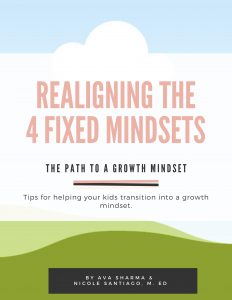The 5 Student Mindsets
Does your teen/tween have a Growth Mindset or 1 of the 4 Fixed Mindsets when facing adversity?

How does your teen/tween think and respond when it comes to adversity, whether in school or in their personal lives?
Children start to develop a mindset, or an attitude, towards learning and adversity. These mindsets shape their decision making processes for years to come, and can have a lasting impact on their outcomes and achievements.
You may be familiar with the growth mindset and the fixed mindset, but to help you understand how to help your children undergo a mindset shift, we’ve broken down the fixed mindset into 4 categories – Defeated, Doubtful, Unmotivated, and Rejecting.
Unsure which mindset your son/daughter has? Try taking the mindset quiz first >>
1. The Defeated Mindset
Detailed profile:
The defeated mindset can be characterized by a tendency towards hopelessness in the face of minor pressure, failure, rejection, or adversity, whether in academics or otherwise. A student with this mindset prioritizes their education relatively low in comparison to their social life, and academically may feel easily overwhelmed or defeated, and have very little trust in themselves. They have an innate belief that they aren’t capable of doing very well, so they tend to have low expectations for themselves. Towards family, they tend to be very private and withdrawn.
What this attitude sounds like:
- “I can’t.”
- “What’s the point?”
- “I just don’t have what it takes.”
2. The Doubtful Mindset
Detailed profile:
The doubtful mindset is characterized by a tendency towards people pleasing and agreeableness, whether socially or to parents. They put a lot of pressure on themselves, and do their best to stay on top of their school work. If/when they do poorly, they are quick to retreat into self loathing talk or thoughts. Their mannerisms are polite and respectful with most people, except perhaps with younger siblings. Socially, they have friends, but can be a bit introverted. Their personality is likely to be extremely self conscious. These kids can be easily trusting of others, especially those in an authority position.
What this attitude sounds like:
- “I don’t know if I can.”
- “I’ll try, but I’m not sure I’ll be able to do it.”
- “Maybe I just don’t have what it takes.”
3. The Unmotivated Mindset
Detailed profile:
The unmotivated mindset is characterized by an apathetic attitude and mild arrogance. Academically, these students may get grades in any range, high achieving to low, but regardless, they are very capable and have at least one aspect of their lives in which they are well above average. They can be rather competitive, but if the challenge is too great or if they fail, they can quickly retreat into self loathing or hide behind an ego mask. In their mannerisms, they can be easily irritated or agitated, particularly towards family members.
What this attitude sounds like:
- “I’ll do it later.”
- “It’s easy.”
- “I don’t feel like it.”
4. The Rejecting Mindset
Detailed profile:
The rejecting mindset is characterized by a defiant attitude. They don’t place a high priority on academics, and may be apt to deceive or manipulate, if it serves them. They can be extremely private about their work, preferring to do it in their head, rather than on paper, and dismiss or minimize their mistakes, shifting the blame to something external. These kids place a high value on appearing superior and are highly sensitive to perceived criticism of any sort.
What this attitude sounds like:
- “It’s not my fault.”
- “That’s so unfair!”
- “That’s a pointless class anyway.”
5. The Growth Mindset
Detailed profile:
The growth mindset is characterized by optimism, curiosity, and valuing learning over the embarrassment of making mistakes, failure, rejection, and the possibility of adversity. They exude kindness and confidence. They regularly do things outside of their comfort zone, and place a high value on integrity.
What this attitude sounds like:
- “I’d like to try.”
- “I’ll do it!”
Helping your teen/tween develop a Growth Mindset
For more information about the 4 fixed mindsets and what you can do to help your kids transition into a growth mindset, download our free guide, Realigning the 4 Fixed Mindsets:
Join our Facebook group!
Raising Motivated Kids is a private facebook community for parents and educators that aim to raise motivated kids.
Ready for a mindset shift?
Schedule your free consultation today!
BRIDGE OF EMPOWERMENT
©2021 Bridge of Empowerment

